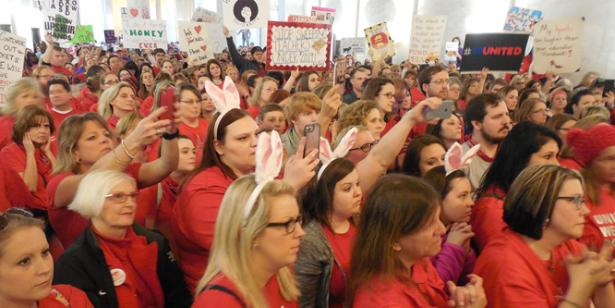Huge congratulations to friends and brothers Peter Olney and Glenn Perusek for the new important book they edited, Labor Power and Strategy. It is a smart and compelling discussion about labor strategy starting with an interview with historian and thinker John Womack with responses by some of the most successful strategists today in the American labor movement.
During the 2005 split1 in the American labor movement I discussed strategy publicly every day as I tried to defend labor unity and solidarity in the media and in endless debates, often with close friends.
I will always regret not using all that time in the media to make the case for unions regardless of federation, for speaking to working people about what matters most: our children's lives and family security, our own self-respect and dignity, the human nature of collective action, the quality of our short lives.
It is important to remember that organizing always begins and ends with workers and whether they are willing and prepared to risk all that a job means to win a better life and security, dignity and respect.
And we need all the effort on organizing we can muster. Right now, we need to give everyone we can, the opportunity to organize their workplace and win a measure of workplace justice.
We need new members and new blood. We need new leaders from the streets, dirt roads and grassroots.
We also need a labor movement willing to fight for all workers in part so that good-hearted people are drawn to it. We need a labor movement willing to exercise what power we have left for the American working class, all workers union or not.
Except for a few folks who can decide where they will work, we don't have the luxury of picking which industries to organize.
Bill Fletcher's question in his response to Womack is on point. Should Spartacus have organized the slaves??
I would ask should SEIU or AFSCME2 have organized hundreds of thousands of home caregivers?
Should Cesar Chavez and Dolores Huerta have organized the farmworkers and trained the organizers who changed California?
The most important strategic question is how we develop strategies that help workers in struggle win.
We need massive organizing campaigns everywhere with public fights for justice.
We need community fights for working class power. The West Virginia teacher strike victories were the result of courageous local schoolteacher leaders. BUT THEY WERE GREATLY HELPED BY LOCAL SUPERINTENDENTS WHO CLOSED THE SCHOOLS RATHER THAN SCABBING THE STRIKERS. That was partly a function of human relationships and community solidarity.
We need supply chain leverage not just for contract fights but also to protect workers who want a union.
This is a valuable and important book that mainly focuses on the question of sectoral, industrial and positional power.
But there are equally important questions that are more human than industrial: How do we move toward movement?
How do we use human relationships to leverage community power?
How do we interrupt the rightward shift of parts of the working class?
What are the social and political pressure points to win an environmentwelcoming of workers organizing?
How do we use the most human of endeavors, organizing for collective power and solidarity, to win steps toward new power over our own lives?
Labor Power and Strategy is a provocative and compelling take on this question, and the dialogue between organizers and educators is the kind of far reaching discussion we need to advance our workers movement.
1 Multiple unions: Teamsters, Service Employees, Hotel Workers, Farmworkers, United Food and Commercial Workers and Laborers split from the AFL-CIO to form Change to Win
2 Service Employees International Union (SEIU) and American Federation of State County and Municipal Employees (AFSCME) two of the largest unions in the US focused mainly on service workers.
Stewart Acuff is a retired union and people’s organizer living in West Virginia where he continues to organize. Acuff was president of the Fulton County Labor Council in Georgia for 9 year from 1991. In 2002 he was appointed Director of Organizing for the national AFL-CIO.
Labor Power and Strategy PM Press 2022 (isbn 978 1629 6397 41)


Spread the word